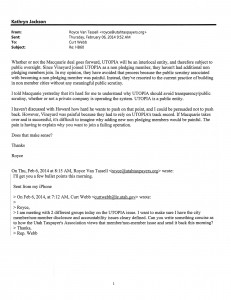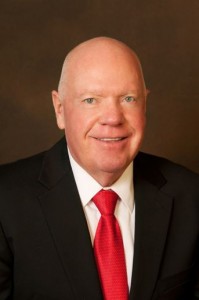 Once HB60 hit the wires, I was quick to file a GRAMA request to find out what kind of communication Rep. Curt Webb had been receiving on the bill. Most of it is angry emails from Utah residents, many of whom were not accepting Rep. Webb’s cut-and-paste boilerplate reply about “transparency”. Here’s what he wrote along with my comments on each part:
Once HB60 hit the wires, I was quick to file a GRAMA request to find out what kind of communication Rep. Curt Webb had been receiving on the bill. Most of it is angry emails from Utah residents, many of whom were not accepting Rep. Webb’s cut-and-paste boilerplate reply about “transparency”. Here’s what he wrote along with my comments on each part:
Somehow the bill has gotten mischaracterized in the public eye. I have met with lobbyists and industry people over the past few days. I believe that much of the misunderstanding has been cleared up, and you may see a few minor amendments to provide that clarification. If it did what is being said of the bill, it would violate all of my conservative free market principles and run contrary to my voting record.
Actually, Rep. Webb, we understand the restriction all too well. You’ve been had. Just own the turkey and move on.
The bill does not prohibit infrastructure expansion. In fact it addresses no other entity than UTOPIA. UTOPIA is government entity created by an interlocal agreement and the public asks for and deserves transparency and accountability of them. The bill requires that any city into which UTOPIA expands become a member city. HB60 is not designed to damage UTOPIA is any way, but rather to provide clarity and accountability to citizens who may be involved in that expansion.
When UTOPIA builds in a non-member city, it has to negotiate a franchise agreement with that city like any other telecom builder. It’s already on a level playing field. Non-member cities can enforce transparency and accountability via this agreement. The only distinction with a member city is that the franchise agreement has been negotiated in advance for the entire municipality. By prohibiting UTOPIA from negotiating franchise agreements except on a citywide basis, you’re making them play by a different set of rules. That is, at the very core, damaging.
Why? Example: We must keep in mind that UTOPIA is an entity composed of member cities. If an expansion were installed in a non member city, and problems with the network arose; who would the citizens in that area turn to? That user is not a citizen of the proviing [sic] entity. Their own non member city could say “We are not UTOPIA.” If they turned to UTOPIA for help, those member cities could say “You are not our constituent”.
We’ve already established that the franchise agreement gives the non-member city power to establish and enforce terms with UTOPIA. It seems like Rep. Webb either doesn’t understand franchise agreements or is convinced that unless cities increase their involvement with UTOPIA, they won’t enforce the provisions of them. The former is most likely as the latter is simply outlandish. Unless, of course, he’s conceding that cities don’t properly enforce the terms of franchise agreements with operators like CenturyLink and Comcast. That, however, seems unlikely.
The bill only applies only [sic] to government entities as providers, (iProvo no longer applies), and requires as a matter of government accountability to users, that expansion areas become member cities. Some already have.
The cities are and have been accountable to their citizens, member or not.

Email between UTA and Curt Webb on HB60
So I find myself wondering how his confused logic spawned this bill in the first place. Then I came across the one email not between Rep. Webb and someone furious at this bill: an exchange between himself and none other than Royce Van Tassell of the Utah Taxpayers Association! Most telling, Rep. Webb emailed Van Tassell directly and out of the blue to solicit their talking points on the issue.
Unshockingly, the UTA has the same fundamental misunderstandings of how franchise agreements work as Rep. Webb expressed in his missive. Van Tassell also alluded to the push coming straight from UTA’s president, Sen. Howard Stephenson. Don’t take my word for it: read the email yourself.
This is just the latest in the long and disturbing trend of incumbent providers funneling money into a sitting senator’s company to influence the legislative process from the inside while keeping their hands “clean”. How the voters of Draper can tolerate it is beyond me. It’s my hope that they’ll wise up to it and send Stephenson packing.






